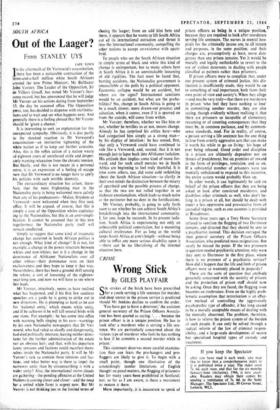Wrong Stick
CRIME
By GILES PLAYFAIR
'You have got to have a deterrent,' the assistant general secretary of the Prison Officers Associa- tion has been quoted as saying, . . because the prison officer is in a unique position. He has to look after a murderer who is serving a life sen- tence. We are particularly concerned about the vicious type of murderer who feels he has nothing to lose if he commits a second murder while in prison.'
This statement deserves more careful examina- tion than one fears the pro-hangers and pro- floggers are likely to give it. To begin with a small point, though one illustrative of the astonishingly insular limitations of English thought on penal matters, the flogging of prisoners has for many years been prohibited in Scotland; nor, so far as I am aware, is there a movement to restore it there.
More importantly, it is inaccurate to speak of
prison officers as being in a unique position, Cr because they are required to look after murderers serving life sentences. The nurses in mental hos- pitals for the criminally insane are, to all intents and purposes, in the same position; and their charges are, presumptively at least, more dan- gerous than any prison inmates. Yet it would be morally and legally unthinkable to revert to the use of violent deterrents in dealing with people classified as patients rather than prisoners.
If prison officers were to complain that, under our present system of criminal justice, this dis- tinction is insufficiently made, they would be on to something of real importance, both from their own point of view and society's. When they allege —and maybe very truly—that there are murderers in prison 'who feel they have nothing to lose' in committing another murder, they are also saying, though evidently without realising it. that there are prisoners so incapable of elementary reasoning or of counting consequences that they must be, in common parlance, and by common- sense standards, mad. For in reality, of course, a person serving a life sentence has the one thing to lose from overtly aggressive acts that can make it worth his while to go on living: his hope of ever being released. Good order and discipline in a prison are ultimately dependent not on threats of punishment, but on promises of reward in the form of privileges, remission, and so on. If a substantial number of prisoners were too mentally unbalanced to respond to this incentive, the entire system would probably blow up.
In other words, it can legitimately be said on behalf of the prison officers that they are being asked to look after convicted murderers. and doubtless other criminals as well, who don't be- long in a prison at all, but should be dealt with under a less oppressive and provocative form of custodial regime, such as one assumes is provided at Broadmoor.
Some three years ago, a Tory Home Secretary refused to sanction the flogging of two Dartmoor inmates, and directed that they should be sent to a psychiatrist instead. This decision outraged the then general secretary of the Prison Officers Association, who predicted mass resignations. But surely he missed the point. If the two prisoners in question needed psychiatric attention, why were they sent to Dartmoor in the first place, where there is no pretence of a psychiatric service? How did it happen that the life and limb of prison officers were so wantonly placed in jeopardy?
These are the sorts of question that anybody genuinely concerned with the security of prisons and the protection of prison staff should now be asking. Once they are faced, the flogging issue becoMes an irrelevance. Even on the highly prob- lematic assumption that terrorisation is an effec- tive method of controlling the aggressively psychopathic type of offender, it has long ceased to be a morally acceptable means of dealing with the mentally abnormal. The problem, therefore, is how to relieve the prison system of the burden of such people. It can only be solved through a radical reform of the law of criminal respon- sibility, and a large-scale development of secure but specialised hospital types of custody and treatment.


































 Previous page
Previous page